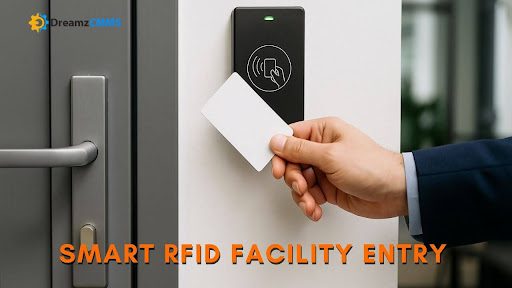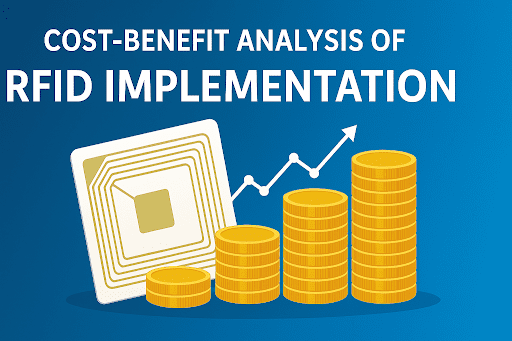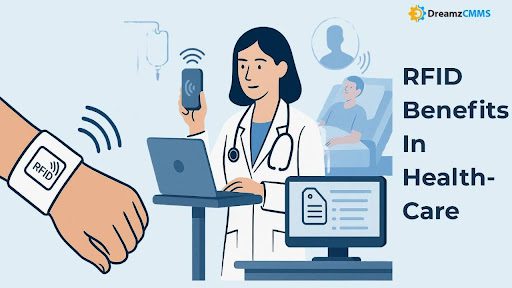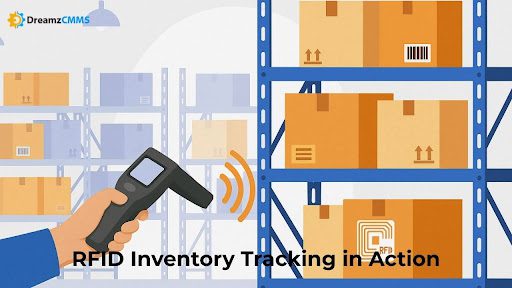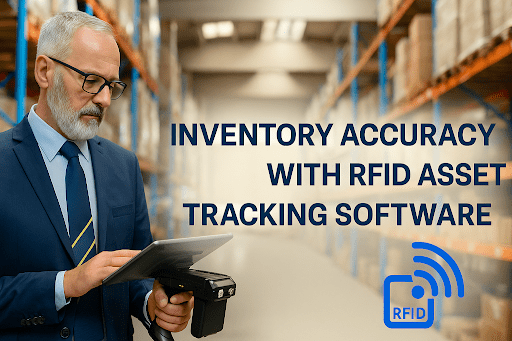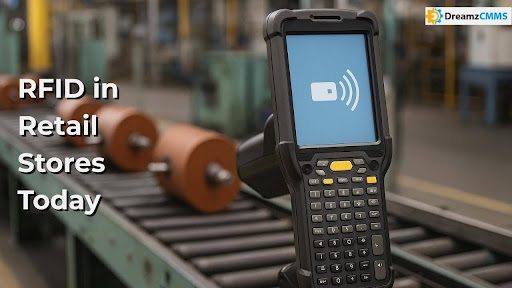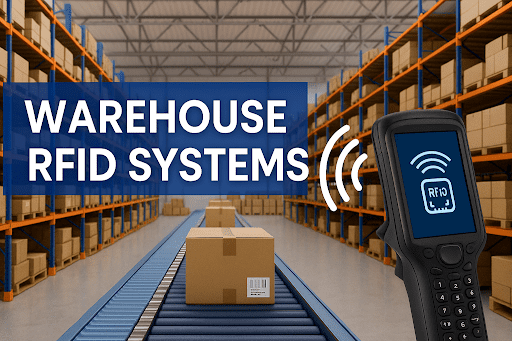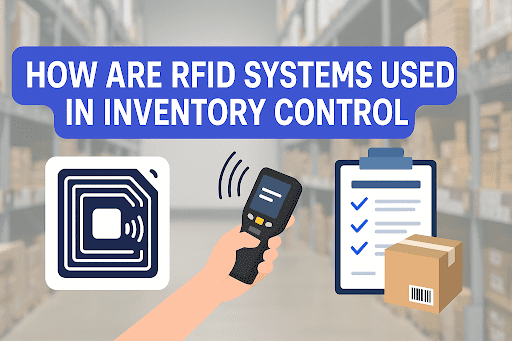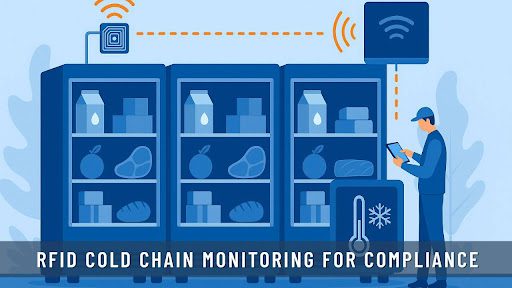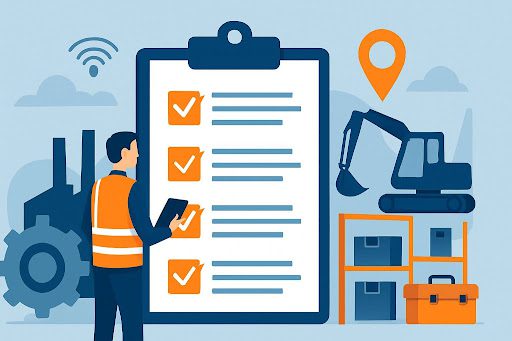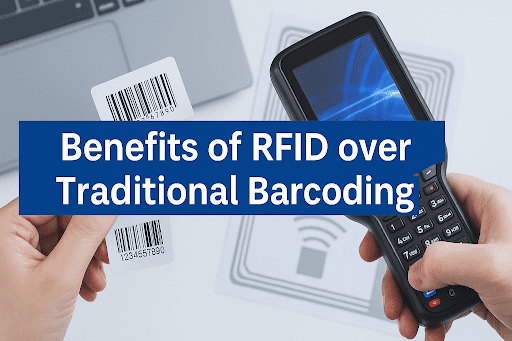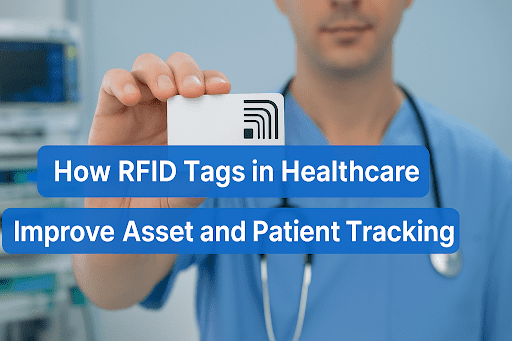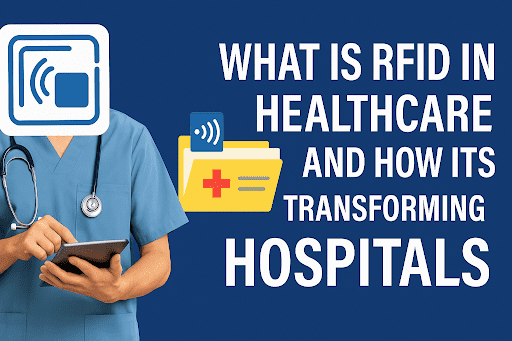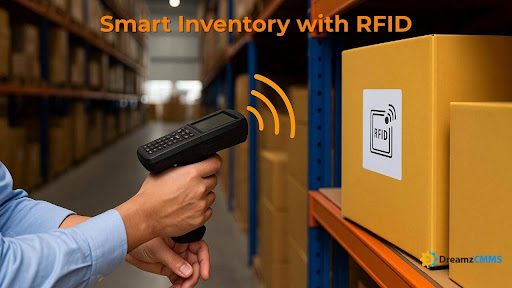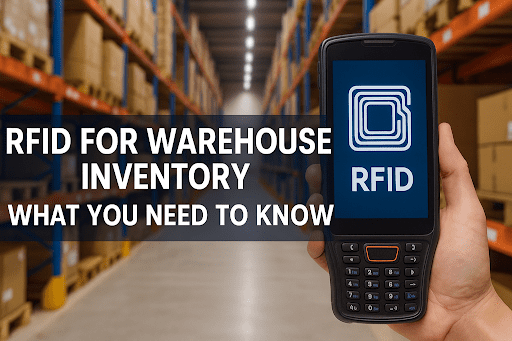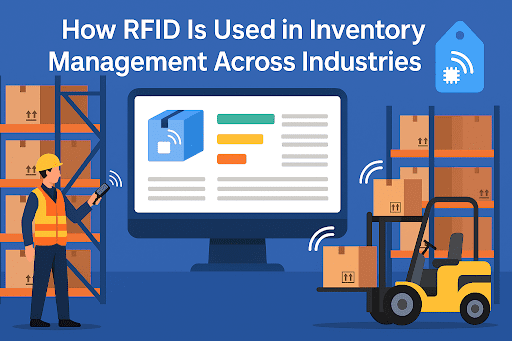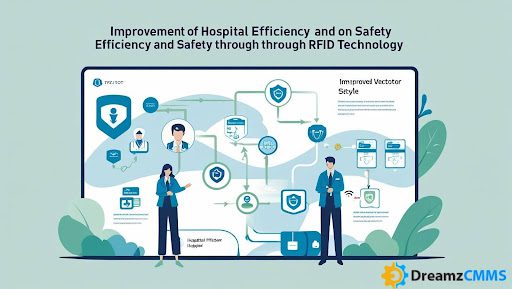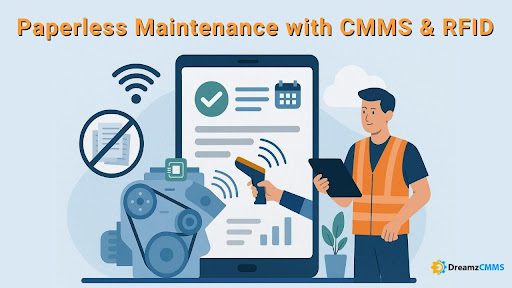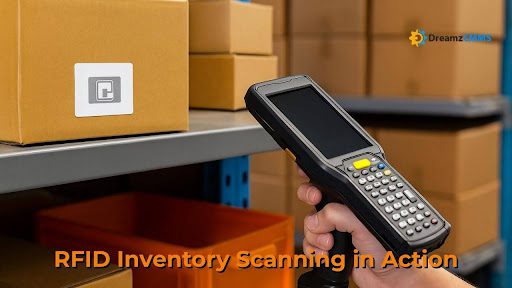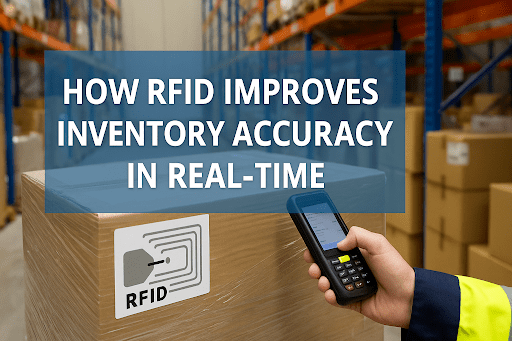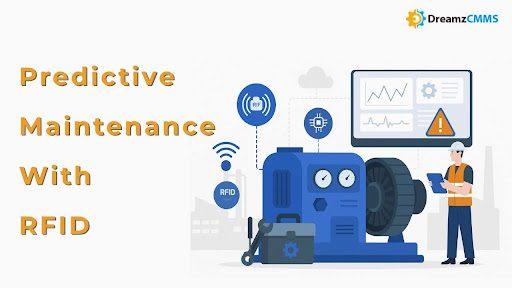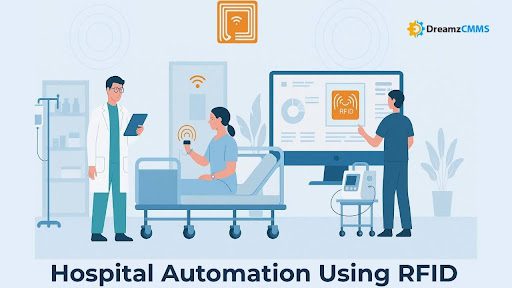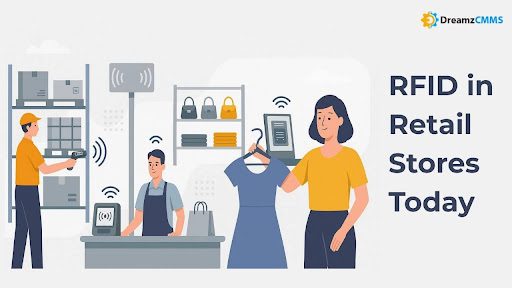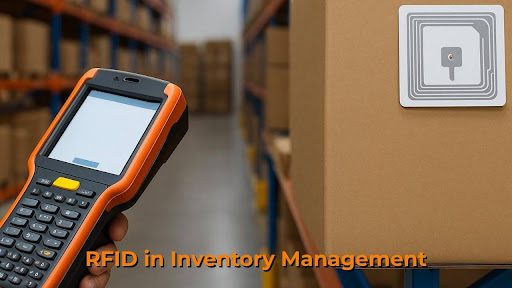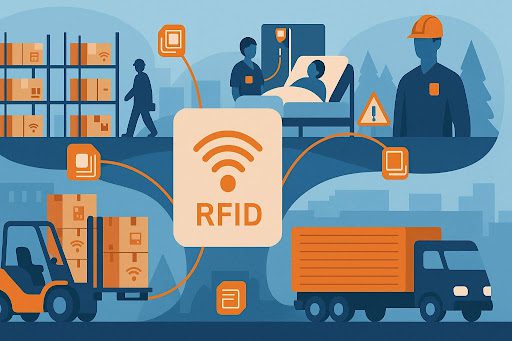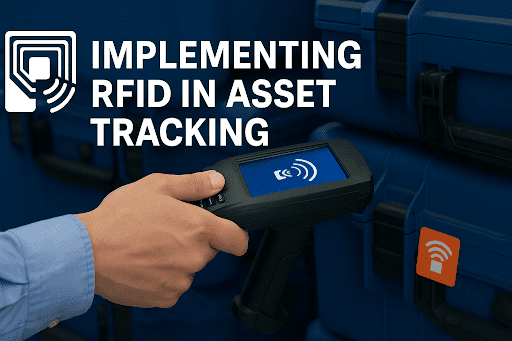 BACK TO Blog
BACK TO Blog
Asset Rental Management
RFID Asset Tracking
How Is RFID Used in Healthcare | Asset and Patient Tracking
- August 14, 2025
- DreamzCMMS Team
- 10 minutes read
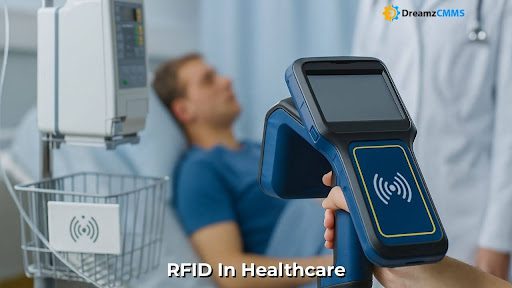
- August 14, 2025
- DreamzCMMS Team
- 10 minutes read
Healthcare operates at a quick pace requiring non-negotiable efficiency alongside accurate tracking systems and patient safety measures. Medical facilities along with hospitals maintain operations under intense pressure which produces dangerous results from every delay and error. Radio Frequency Identification (RFID) has established itself as a transformative healthcare technology among multiple industry-changing developments.
RFID technology enables real-time asset and patient tracking to enhance workflows while reducing costs and preventing equipment losses and improving patient safety. The technology modifies hospital operations through its applications in RFID medical asset tracking and RFID patient tracking systems and RFID healthcare inventory management.
This article explores healthcare RFID applications and demonstrates their practical implementations while explaining RFID in healthcare and its various hospital applications.
What Is RFID Technology in Healthcare?A standard healthcare RFID system includes:
|
Key RFID Healthcare Applications
1. RFID Medical Asset Tracking
Medical equipment availability and operational readiness become possible through RFID hospital asset management systems. Medical facilities maintain thousands of assets including portable X-ray machines and wheelchairs so losing track of any item creates significant expenses.
Benefits include:
- Medical equipment tracking is available in real time.
- Theft and loss prevention with zone alerts.
- Automatic usage history for maintenance scheduling.
- Increased asset utilization and reduced rental costs.
RFID Asset Tracking Software combined with hospitals enables staff to track equipment from a single point and schedule preventive maintenance to minimize downtime.
2. RFID Patient Tracking Systems
Medical facilities require exact patient location data because this information directly saves lives. The tracking system employs wristband RFID chips to store and transmit patient information through the RFID patient tracking system.
Applications include:
- Real-Time Location Tracking – Quickly locate patients for scheduled procedures.
- Patient Identification – Match patients to the right medications and treatments.
- Infant Protection – Prevent newborn mix-ups and unauthorized removals from maternity wards.
- Emergency Situations – Identify and locate patients during disaster responses.
RFID patient safety applications reduce treatment errors while boosting hospital operational efficiency.
3. RFID Healthcare Inventory Management
Healthcare inventory management through RFID technology enables better control of medical supplies and surgical instruments and pharmaceutical products.
Key benefits:
- Automated stock level updates.
- Expiry date monitoring for medications.
- Reduced stockouts and emergency orders.
- Faster restocking through automatic reorder triggers.
Hospitals that implement advanced analytics alongside their RFID systems gain better inventory forecasting capabilities which leads to cost reduction and waste elimination and improved budgeting practices.
4. RFID in Surgical Instrument Tracking
The improper retention of surgical instruments leads to serious adverse effects in medical procedures. Surgical trays along with individual tools receive RFID tags to provide accurate counting before, during and after medical procedures.
Advantages include:
- Compliance with surgical safety protocols.
- Automated sterilization cycle tracking.
- Reduced liability from surgical errors.
5. RFID Hospital Management Systems
Modern RFID hospital management systems integrate multiple functions:
- Asset Tracking – Locating equipment instantly.
- Patient Flow Monitoring – Tracking patient movement from admission to discharge.
- Inventory Control – Managing medical supplies and drugs.
- Compliance Recording – Maintaining accurate logs for audits.
Facilities that use RFID systems also implement Asset Rental Management Software to manage rental equipment effectively and avoid both overstocking and underutilization.
RFID Healthcare Benefits
RFID healthcare benefits surpass basic asset location tracking because they generate tangible advantages for patient care along with cost reduction and operational dependability.
1. Improved Operational Efficiency
RFID hospital asset management enables healthcare staff to find essential equipment much faster thus allowing them to spend more time caring for patients and less time searching for medical equipment such as wheelchairs and ventilators and infusion pumps. The faster availability of assets enables better emergency service delivery to patients.
2. Cost Savings
Hospitals using RFID medical equipment tracking systems decrease their expenses through asset loss prevention and avoid unnecessary purchases and emergency equipment rentals. Real-time asset monitoring enables medical facilities to redirect unused equipment instead of buying additional units. The long-term operational efficiencies result in major financial savings for healthcare institutions.
3. Regulatory Compliance
Through RFID systems healthcare facilities automatically create usage and maintenance logs of assets which help institutions meet their accreditation standards and compliance requirements. The system generates accurate timestamped audit records which make retrieval straightforward during assessment procedures. - Explore more Cost-Benefit Analysis of RFID Implementation
Real-World Examples of RFID in Healthcare
1. Emergency Departments –
RFID patient tracking systems help monitor patient flow from arrival to discharge in emergency settings which are characterized by high-pressure situations where seconds matter. Through RFID badges staff members and patients can track their wait times and identify system delays and follow proper priority care sequences. The implementation of data analytics in emergency care leads to more efficient operations and less patient congestion.
2. Pharmacy Operations –
The management of high-value and sensitive medications within hospitals requires tight adherence to regulatory standards. The implementation of RFID healthcare inventory management systems in smart cabinets tracks controlled substance access while recording all transactions and sends alerts when unauthorized entry occurs. The system strengthens RFID patient safety protocols by lowering prescription mistakes and protecting medications from theft.
3. Infant Wards –
The use of RFID patient safety applications stands as a vital requirement in maternity and neonatal departments because newborns face a high risk of mix-ups or kidnappings. When hospital security systems detect baby bracelets with RFID tags moving into unauthorized areas they send immediate alerts to protect infants from potential harm.
4. Maintenance Teams –
The implementation of RFID medical equipment tracking systems enables biomedical engineers and facility maintenance teams to perform scheduled device servicing. The RFID tags help track equipment usage which enables better preventive maintenance scheduling and reduces equipment downtime and ensures regulatory compliance for safety standards. The system delivers maximum value through its integration with Asset Maintenance Management Software which enables automated scheduling capabilities.
RFID Patient Safety Applications in Practice
The use of RFID technology in oncology centers enables medical staff to verify that chemotherapy drugs are assigned to the correct patient before giving treatment. The real-time alerts of RFID systems notify mental health staff when patients access restricted areas.
RFID patient safety applications decrease both clinical errors and speed up response times.
RFID Healthcare Inventory Management for Cost Savings
RFID healthcare inventory management brings more than basic stock control because it delivers concrete operational advantages together with financial benefits. Hospitals which have deployed RFID-enabled inventory systems have reported:
- Up to 50% Reduction in Inventory Loss – The real-time location tracking of medical supplies through RFID technology leads to a 50% decrease in inventory loss rates. The system protects high-value surgical tools along with implant devices and critical medications from loss.
- 40% Fewer Emergency Orders – The precise tracking of consumption patterns allows hospitals to predict supply requirements and prevent expensive last-minute emergency purchases or delayed shipments.
- Improved Budgeting Through Accurate Consumption Tracking – Accurate consumption tracking enabled by RFID systems allows procurement teams to establish precise forecasting which leads to better supplier deals and reduces waste from overstocking.
- RFID medical equipment tracking and consumables management enable the prevention of expired items from being used thus improving RFID patient safety applications while minimizing liability risks. RFID healthcare cost reduction improves substantially through these advancements which enables hospitals to redirect saved funds toward patient care or staff training and advanced technology investments.
RFID hospital management systems together with analytics enable inventory managers to identify patterns which helps them optimize reorder points for developing sustainable supply chain strategies that support cost-efficient care delivery.
Medical Device RFID Tracking
Medical device RFID tracking serves dual purposes by helping healthcare institutions adhere to safety regulations while ensuring essential equipment remains operational. Medical facilities can track their medical devices with RFID tags embedded in defibrillators, ventilators, infusion pumps and other equipment to achieve the following benefits.
- Automate Preventive Maintenance Scheduling
RFID hospital asset management systems generate precise usage records which automatically start maintenance notifications based on device operation time instead of pre-set time intervals. By performing services during optimal times healthcare facilities can minimize equipment failures and lengthen the lifespan of their medical equipment.
- Track Sterilization Cycles for Reusable Devices
The proper tracking of sterilization procedures is required for surgical tools as well as endoscopes and all other reusable instruments. The sterilization history of medical instruments can be stored by RFID tags which enables staff members to verify the cleaning process and confirm medical safety for patients.
- Comply with FDA Unique Device Identification (UDI) Regulations –
The FDA Unique Device Identification (UDI) Regulations can be fully complied with through RFID technology in healthcare because it enables automatic logging of device identifiers and usage and maintenance records. This approach helps hospitals maintain UDI requirements which facilitates product recall management as well as warranty claim handling and regulatory inspection activities.
The guide to Implementing RFID in Asset Tracking provides necessary deployment best practices.
Challenges in RFID Healthcare Implementation
RFID healthcare solutions provide major benefits yet implementing them faces multiple challenges during implementation.
- Initial Capital Investment – The cost of initial capital investment stands as the primary obstacle for deploying RFID because it includes the expenses for tags and readers and antennas and management software. Although the long-term ROI is often substantial, budget constraints can delay adoption.
- Integration Issues –Legacy hospital management systems may require upgrades or custom APIs to work seamlessly with new RFID hospital management systems, adding to project complexity.
- Data Security – The need for strong encryption together with secure access controls and HIPAA compliance and strict data protection protocols becomes essential when tracking sensitive patient and asset information with RFID tracking systems.
- Staff Adoption – Introducing RFID changes workflows. The adoption of new processes by staff will decrease when they lack proper training and change management which results in system adoption delays and reduced effectiveness.
The implementation of RFID systems becomes feasible for hospitals through the deployment of small-scale pilot projects which allow system refinement before full-scale implementation across the entire facility. The phased implementation method decreases risks while building employee trust and produces better healthcare RFID system implementation results.
ConclusionThe medical sector uses RFID technology to enhance safety measures while improving operational efficiency and reducing costs in hospital environments. Hospital operations undergo a transformation because RFID technology supports three main applications: RFID medical asset tracking and RFID patient tracking systems and RFID healthcare inventory management.RFID technology delivers both scalability and cost-effectiveness to solve RFID hospital asset management needs as well as medical device tracking requirements and patient safety requirements. Our solutions are available on this page:
|
Final Call to Action
DreamzCMMS provides healthcare facilities with RFID hospital management systems that enhance operational performance and patient treatment quality. Our RFID solutions exist to deliver reliable and scalable solutions for asset tracking and patient safety applications.
DreamzCMMS offers complete healthcare RFID solutions which you can learn about on our website.
Ready for More?
Talk to one of our CMMS experts and see how DreamzCMMS can simplify your maintenance operations.
Book a free consultation